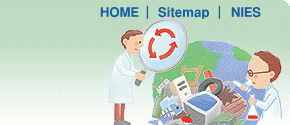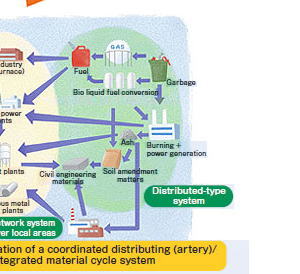



Specific targets of this project include a technology system to recover potential fuel materials as a source of energy, a technology system to recover and utilize useful materials, and material cycle systems permitting fuller exploitation of upper-stream distributing (artery) systems. They constitute three subthemes; the first and second are to develop elemental technologies, and the third is primarily to develop a system.
Mainly targeting low-moisture-content waste biomass, we will develop a technology system to ensure the satisfactory operation of a pyrolysis gasification -gas -reforming process at low temperature as an elemental technology for a regional-level recycled energy utilization system. With this technology, useful gas elements constituting sources of energy such as hydrogen, carbon monoxide and methane will be generated and utilized in power generation systems including fuel cell systems, and in this way, the achievement of both proper waste disposal and contribution to global warming prevention (win-win-type application) will be targeted. Apart from gas production, we will also promote research to develop highly efficient, energy conservation, resource conservation methods for both fuel conversion technology and separation / refining technology in connection with liquid fuel (biofuel) production. Further, we will aim at constructing a recycling system based on biofuel through demonstration tests of the developed technologies.
On the other hand, for high-moisture-content biomass such as raw garbage and livestock waste, we will develop optimal elemental technologies for microorganism-induced reaction applied-type, hydrogen and methane fermentation systems and associated advanced water treatment systems with a view to applying such systems at regional level. We will work out criteria to accept biomass in a fermentation process, determine fermentation process operation conditions and a recycling manual, and develop a carbon recycling-type system reflecting considerations for economic viability, life cycle assessment, etc. Through this activity, we aim at promoting the construction of a regional recycling network.
One is the R&D of a new technology system to deal with food waste and to recycle waste biomass for utilization as feed and biodegradable plastics (zero-emission system involving cascade-type C, N, P element utilization) by further improving conventional recycling technology such as biomass conversion into compost, biogas or charcoal. More specifically, we will use raw garbage generated from businesses for lactic acid fermentation using specific lactobacilli and develop a technology to recover L-lactic acid from filtrate and various biodegradable plastics products and a technology to totally convert residues to feed for their utilization in poultry production, etc. After feed quality and its effect on fowl are assessed in actual feeding tests, a model farm demonstration experiment will be conducted for development as a business model.
The other is R&D to design and develop an optimum system to deal with phosphorus resources contained in liquid organic waste by combining the development of a phosphorus recovery/recycling technology system using the adsorption dephosphorization method, iron electrolytic dephosphorization, or the like with a sludge compaction process, etc. We will conduct research especially to develop a comprehensive technology system based on characteristics analyses made in a distributedtype system model area by establishing quality control measures reflecting considerations for the scale of operations; liquid waste properties; the distribution, marketability and utilization characteristics of recovered phosphorus; and so on with the objective to achieve further integration, efficiency improvement and downsizing of the target system and put a recovery-refining technology system to practical use.



